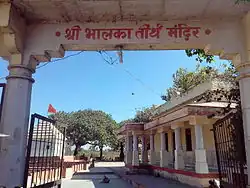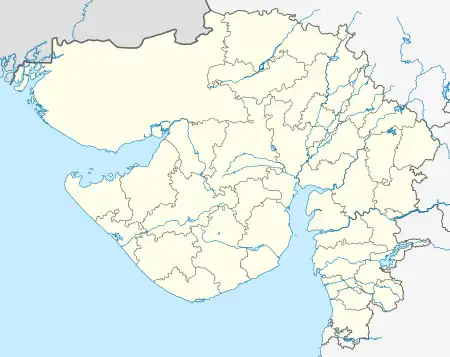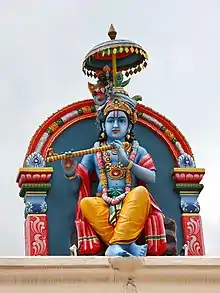Bhalka
Bhalka Tirtha (transl. Bhalka pilgrimage), located in Veraval on the western coast of Gujarat, India, is the place where Krishna took last breath. It is said that he was killed by an arrow shot by a hunter named Jara, with Krishna's body suffering severe and subsequently fatal injuries. Puranas as Shri Krishna Nijdham Prasthan Leela.[1][2] Bhalka is part of the Lord Krishna circuit (Mathura, Vrindavan, Barsana, Govardhan, Kurukshetra and Dwarka).
| Bhalka Tirtha | |
|---|---|
भालका तीर्थ | |
 | |
| Religion | |
| Affiliation | Hinduism |
| District | Gir Somnath |
| Deity | Krishna |
| Governing body | Shree Somnath Trust |
| Location | |
| Location | Veraval |
| State | Gujarat |
| Country | |
 Location within Gujarat
(around 3)  Bhalka (India) | |
| Geographic coordinates | 20°53′16.9″N 70°24′5.0″E |
| Website | |
| somnath.org | |
Bhalka is located just 4 kilometres from Somnath Temple, a Jyotirlinga, situated in Veraval, Gujarat, India.
The site also has ancient history as Prabhas Patan was occupied during the Indus Valley Civilisation, 2000–1200 BCE.
Background

According to Mahabharata, the Kurukshetra war resulted in the death of all the hundred sons of Gandhari. On the night before Duryodhana's death, Krishna visited Gandhari to offer his condolences. Gandhari felt that Krishna knowingly did not put an end to the war, and in a fit of rage and sorrow, Gandhari cursed that Krishna, along with everyone else from the Yadu dynasty, would perish after 36 years. Krishna himself knew and wanted this to happen as he felt that the Yadavas had become very haughty and arrogant (adharmi), so he ended Gandhari's speech by saying "tathastu" (so be it).[3][4]
After 36 years passed, a fight broke out between the Yadavas, at a festival, who killed each other. His elder brother, Balarama, left his body through Yoga. Krishna retired into the forest and started meditating under a tree. The Mahabharata also narrates the story of a hunter who becomes an instrument for Krishna's departure from the world. The hunter Jara mistook Krishna's partly visible left foot for that of a deer, and shot an arrow, mortally wounding him. After Jara realised his mistake, while still bleeding, Krishna told Jara, "O Jara, you were Vali in your previous birth, killed by myself as Rama in Treta Yuga. Here you had a chance to even it and since all acts in this world are done as desired by me, you need not worry for this". Then Krishna, with his physical body[5] ascended back to his eternal abode, Goloka and this event marks departure of Krishna from the earth.[6][7][8] The news was conveyed to Hastinapur and Dwaraka by eyewitnesses to this event.[5] The place of this incident is believed to be Bhalka, near Somnath temple.[1][2]
According to Puranic sources,[lower-alpha 1] Krishna's disappearance marks the end of Dvapara Yuga and the start of Kali Yuga, which is dated to 17/18 February 3102 BCE.[12]
Story
As per the writing in Ramayana, Rama, i.e. Krishna in his earlier Rama avatar (Avatars) is supposed to have given a boon to a Vanar king Vali (Hindu mythology) whom Rama killed stealthily by shooting an arrow, while hiding behind a bush when Vali was engaged in a battle with his younger brother Sugriva, thus fulfilling his promise of protecting Sugriva's life. The above action of the hunter in Krishna avatar (Avatars) is supposed to be in compliance to the boon of Rama. It is believed that Krishna left his footprints. It is a common site of pilgrimage for people who visit Somnath.
Location
Bhalka Teerth is situated almost 4 kilometres away from the Somnath temple. Presently the government has planned to develop this temple also into a major tourist attraction.[1]
Somnath/Veraval City/Bhalka is very well connected via road and rail network. The nearest railway station is Veraval[13] and the nearest airports are Diu & Rajkot. Bus services are available from Ahmedabad, Vadodara, Rajkot, Dwarka etc.
Gallery
 Bhalka Teerth
Bhalka Teerth Sign Board depicting the importance of the place
Sign Board depicting the importance of the place Sign Board depicting the importance of the place
Sign Board depicting the importance of the place
Notes
- The Bhagavata Purana (1.18.6),[9] Vishnu Purana (5.38.8),[10] and Brahma Purana (2.103.8)[11] state that the day Krishna left the earth was the day that the Dvapara Yuga ended and the Kali Yuga began.
References
- "Bhalka Tirth". Somnath Trust. Archived from the original on 29 July 2009. Retrieved 12 April 2015.
- "Gujarat Tourism". Gujarat Tourism. Archived from the original on 27 March 2015. Retrieved 12 April 2015.
- "Lord Krishna's Disappearance, Disappearance of Lord Krishna, Life Span of Lord Krishn, Disappearance of Sri Krishna". Happywink.org. Retrieved 23 October 2011.
- "MAHABHARATA -Krishna's Return to Heaven". Urday.in. Archived from the original on 24 April 2009. Retrieved 23 October 2011.
- "Srimad Bhagavatam :: Conto 11 - The Ascension of Lord Krishna". Bhagavatam.in. Archived from the original on 6 November 2016. Retrieved 24 November 2016.
- Bryant 2007, pp. 148
- Kisari Mohan Ganguli (2006). "The Mahabharata (originally published between 1883 and 1896)". Sacred Texts. Retrieved 13 October 2008.
Book 16: Mausala Parva Sections 4-8
- Mani, Vettam (1975). Puranic Encyclopaedia: A Comprehensive Dictionary With Special Reference to the Epic and Puranic Literature. Delhi: Motilal Banarsidass. p. 429. ISBN 0-8426-0822-2.
- "Skanda I, Ch. 18: Curse of the Brahmana, Sloka 6". Bhagavata Purana. Vol. Part I. Motilal Banarsidass Publishers Private Limited. 1950. p. 137.
On the very day, and at the very moment the Lord [Krishna] left the earth, on that very day this Kali, the source of irreligiousness, (in this world), entered here.
- Wilson, H. H. (1895). "Book V, Ch. 38: Arjuna burns the dead, etc., Sloka 8". The Vishnu Purana. S.P.C.K. Press. p. 61.
The Parijata tree proceeded to heaven, and on the same day that Hari [Krishna] departed from the earth the dark-bodied Kali age descended.
- "Ch. 103, Episode of Krsna concluded, Sloka 8". Brahma Purana. Vol. Part II. Motilal Banarsidass. 1955. p. 515.
It was on the day on which Krishna left the Earth and went to heaven that the Kali age, with time for its body set in.
- See: Matchett, Freda, The Puranas, p 139 and Yano, Michio, Calendar, astrology and astronomy
- "Addl trains chief demand at rly meet". Times of India. 29 January 2015. Retrieved 7 April 2015.
Sources
- Bryant, Edwin F. (2007), Krishna: A Sourcebook, Oxford University Press, ISBN 978-0-19-514891-6
